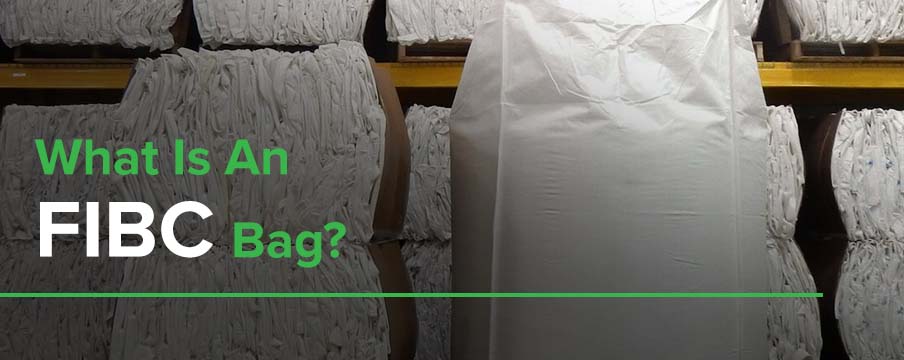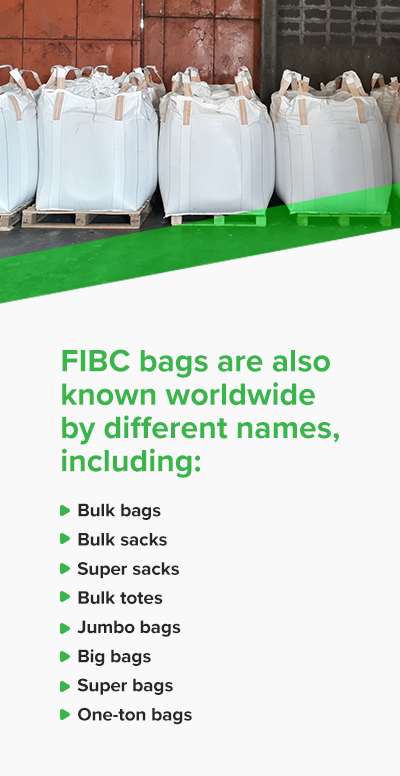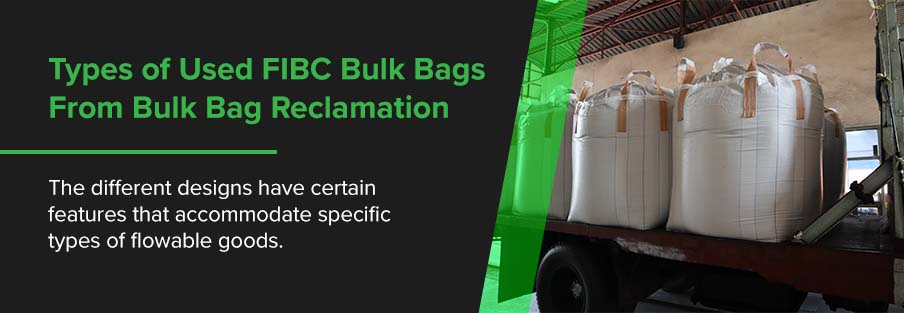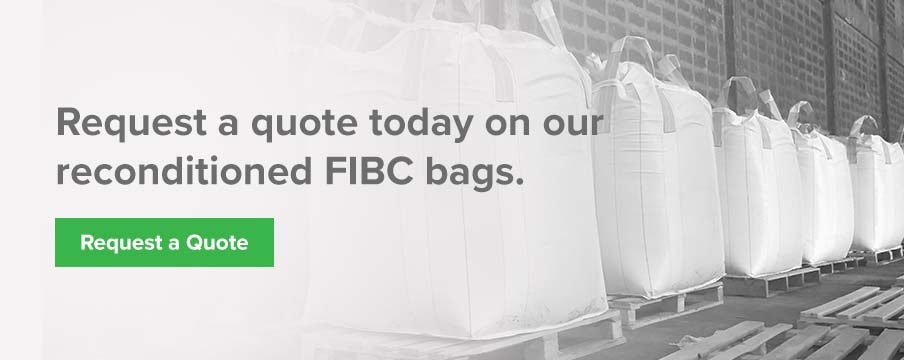What Is an FIBC Bag?

A FIBC is a large bulk storage sack that’s used to help contain, store, transport and ship a variety of different dry flowable and loose goods. FIBC bags are used around the world as an economical alternative to traditional shipping and storage solutions, such as wood pallets, plastic containers or metal bins.
FIBC bags are used because of their practicality, durability, reusability and other beneficial qualities that make them ideal shipping, containing and storage solutions. Depending on what they’re used for, FIBC bags can be made of different materials or designed in different shapes and sizes. FIBC bags are designed to withstand enormous tensile strength, with some types being rated to carry up to 5,000 pounds per bag.
What Does FIBC Stand For?
FIBC stands for Flexible Intermediate Bulk Container.
Other Terms for FIBC Bags
FIBC bags are also known worldwide by different names, including:
- Bulk bags
- Bulk sacks
- Super sacks
- Bulk totes
- Jumbo bags
- Big bags
- Super bags
- One-ton bags

The names for different types of FIBC bags depend on the industry, the types of goods being stored and the applications of the bag themselves. Different FIBC bag terms also refer to the amount of weight they carry, such as a one-ton bag or a jumbo bag referring to the ability to contain one ton of product.
What Are FIBC Bags Made Of?
Manufacturers can use a variety of materials to produce bulk bags. However, the most common material used to produce FIBC bags is polypropylene — a petroleum-based product. Polypropylene is a soft, woven, flexible and lightweight thermoplastic that’s entirely recyclable.
Polypropylene is an inert material, meaning it won’t undergo erosion and degradation due to chemical processes. This property is what gives FIBC bags the durability and reusability that make them so desirable in shipping and storage solutions. The tight weave of polypropylene fibers makes FIBC bags and capable of holding weights exponentially heavier than the material itself. These properties and more are what make FIBC bags beneficial and increasingly popular in the supply chain.
Benefits of Using FIBC Bulk Bags
FIBC bags are becoming more and more popular storage solutions compared to conventional solutions like Gaylord bins, boxes and other containers. Offering numerous benefits for improved workflow and productivity, FIBC bags are the ideal solution for storing flowable goods.
FIBC bags are cost-effective, lightweight, space-saving and environmentally friendly, making them the perfect answer to storing loose goods. Below are the top benefits you get from using FIBC bags.
Worker Safety
In warehouse and supply chain work, protecting worker safety is critical. Repetitive strain injuries (RSIs) are one of the leading causes of injury in the workplace, particularly in warehouses where workers are continuously lifting and moving heavy and bulk materials.
Goods stored in bins, drums and conventional containers run the risk of causing worker injury when workers attempt to lift and move them manually. With bulk bags, workers are not able to handle the goods manually, encouraging them to rely on the use of safe material handling equipment, like forklifts, pallet jacks and hoists.
Using FIBC bags can ensure worker safety while improving productivity and workflow efficiency.
Product Safety
When it comes to safety, it’s not just workers that need to be protected but the goods themselves, as well. Protecting consumable and medical-grade flowable products is critical in preserving health and safety and preventing contamination. Maintaining a sanitary storage and transport environment is vital to the success of business operations and preventing product loss.
FIBC bags are inert, sanitary containers that don’t erode, degrade or undergo chemical reactions, which protects the integrity of the goods stored within. They’re also durable and strong, preventing pests, pathogens and other outside threats from infiltrating the bags through punctures or tears. Being watertight, FIBC bags also prevent goods from being exposed to moisture, which can otherwise breed mold, fungus and bacteria.
Cost-Effectiveness
With supply chain and warehousing costs rising steadily, businesses need economical ways of packaging, storing and transporting materials. Cost-effective storage solutions should be durable and strong enough to be reusable, and they should also help save time and improve efficiency.
FIBC bags reduce overall operating expenses because they are a long-term investment that can continue to serve your operation well into the future. Being lightweight, they can also reduce shipping costs, which are based on total weight.
FIBC bags are also available in reclaimed condition, further adding the cost-effectiveness of this storage solution. Reconditioned bulk bags reduce the cost of materials, as buying new bulk bags is a more expensive alternative.
Recyclability
Increasingly, more businesses are looking for sustainable, recyclable and reusable shipping and storage solutions. Bulk bags have an extensive life cycle, being able to be reused continuously and repeatedly. Reusing FIBC bags helps reduce the amount of waste in landfills. It’s also a more environmentally friendly option than other single-use or shorter-lasting solutions, such as Gaylord boxes.
At the end of the FIBC bag’s life cycle, it can be recycled, reclaimed and reconditioned, sending it back into circulation for further use. Since polypropylene is such a useful material, old FIBC bags can also be recycled into other plastic products using the raw material.
Maximized Storage
Warehouse operations managers are always in search of ways to maximize storage space and make more efficient use of their square footage. Warehouse managers need to plan for storing the goods themselves, and they also need to plan for how to store the storage bins and containers. Pallets, bins, drums and containers take up considerable space compared to FIBC bags.
Being lightweight, soft and pliable, FIBC bags are convenient to store. They easily fold up and become super compact. Since FIBC bags have barely any volume of their own, they’re easy to stack and store. The result is more floor and racking space for a more efficient workflow.
Labor Savings
Labor accounts for a significant portion of overhead costs in the supply chain and in warehouses. Finding ways to maximize productivity can optimize labor costs can make for a more efficient and streamlined operation. By optimizing material handling activities, managers can provide workers with more efficient solutions for carrying out their tasks. Using FIBC bags is one way to maximize productivity and reduce labor costs.
One bulk bag carries a significant amount of product compared to multiple smaller containers, bags or bins. By using bulk bags, there’s less time spent handling materials. It’s much more efficient to lift and haul one bulk bag compared to many other smaller storage bag alternatives.
Improved Transport and Handling
It’s important for managers to find convenient, lightweight and stackable storage solutions to make transportation and handling easier and more efficient. FIBC bags hold exponentially more weight on their own, making them an efficient method of transporting more material in less time and with less effort.
Additionally, bulk bags are designed to be easy to transport, with integrated elevation loops or sleeves that eliminate the need for other devices to help with lifting and loading. Using FIBC bags also means you won’t need additional pallets or loading units. When transporting full FIBC bags, they’re easy to stack safely, freeing up more space in trucks or on racks.
Versatility
When investing in storage solutions, organizations need storage containers that are versatile and can adapt to their evolving business needs. FIBC bags are one of the most versatile solutions for containing, storing and transporting flowable goods. While FIBC bags come in standard sizes and designs, there are some solutions designed for particular applications and weights. It’s also possible to print marketing and content information on FIBC bags, making them customizable to your operation.
Regardless of the type of goods you’re storing, there is an FIBC bag that’s right for you. With plenty of reclaimed bulk bags available on the market, you can find solutions that are both versatile and economical.

Materials You Can Store With FIBC Bags
Due to the versatility of FIBC bags, they’re used abundantly across a variety of industries. Most commonly associated with storing grains and foods, FIBC bags are a preferred storage solution for sanitary containment.
FIBC bags serve a variety of other purposes, including within the following industries and more:
- Agriculture
- Chemical production
- Construction
- Engineering
- Fishing
- Manufacturing
- Mining
- Pharmaceuticals
FIBC bags are also useful for hybrid businesses that operate across industries, providing a flexible packing and storing solution for all your needs.
Some of the most common materials you’ll find stored using FIBC bags include:
- Animal feed, grains and seeds: FIBC bags are a sanitary and effective way to store animal feed, grains and seeds. The agriculture industry relies on packing and storing solutions that prevent pests, mold and other pathogens from infiltrating the supply. FIBC bags preserve and protect agricultural products and prevent product contamination and loss.
- Cement, fiberglass and building materials: To securely carry and store cement and other building materials, rely on FIBC bags for more efficient bulk handling. While FIBC bags offer a convenient material management solution, they also provide a way to better organize construction sites and keep them clean.
- Chemicals, fertilizers and resins: When packing, storing and transporting chemical products, it’s critical to have bulk containment solutions that won’t erode or degrade from chemical reactivity. Since FIBC bags provide an inert storage environment, they’re ideal for packing and transporting a variety of chemical products, fertilizers and resins.
- Food products: In the food processing industry, producers use FIBC bags for convenient and sanitary storage of food products. Potatoes, onions and other food products last longer when stored in watertight and clean FIBC bags.
- Sand, rock and gravel: In mining and quarrying, FIBC bags are useful containment solutions for extracted resources. Whether you produce sand, rock, gravel, soil or other raw aggregates, FIBC bags are a way to carry bulky, heavy loads efficiently and better manage them during transportation.
Types of Used FIBC Bulk Bags From Bulk Bag Reclamation
In addition to knowing the different types of goods that can be stored using FIBC bags, it’s also important to understand the variety of FIBC bag designs available. Some FIBC bag types are more useful in certain applications. The different designs have certain features that accommodate specific types of flowable goods.

Here are the types of FIBC bulk bags to choose from at Bulk Bag Reclamation:
Duffle Top
Duffle top bulk bags are also known as skirt top tote bags. They’re useful across a variety of industries and offer a space-saving solution for freeing up floor space in the warehouse. Duffle top bags allow for direct loading inside the bag during filling, where the skirt remains straight for faster, more accurate filling. You can then close the bag completely after it has been filled to the top.
Spout Top
Spout top bags are a type of bulk bag with an attached panel and cylinder at the top of the bag. This cylinder acts as a spout to help cleanly control material transfer from the filling equipment into the bag. When filled, the cylinder is removed and the top gets tied off.
Spout top bulk bags are used for agriculture materials like animal feed, grains and seeds, as well as cement, resin, sand and aggregates.
Open Top
Open top bulk bags are a type of FIBC bag that allows for ventilation so stored materials can receive airflow. With mesh strips across the top, open top bulk bags promote breathability while encouraging easier filling with the open top. Unlike other bags, open top bags stay open and don’t have a way to tie them shut.
Open top bulk bags are suitable for food products, like potatoes and onions, or any other flowable material that needs to be stored with ample airflow to reduce moisture.
Baffled
Baffled bulk bags are suitable for heavy-duty applications and bulky non-uniform materials. With reinforced panels or baffles, baffled bulk bags are able to retain their shape, which allows for more uniform stacking and easier transportation. Because baffled bags are so durable, they’re able to withstand large and bulky construction materials without the risk of breaking and spilling.
In addition to building materials, baffled bulk bags are also used to pack and store animal feed, chemicals, grains and seeds, as well as rock, gravel and other aggregates.
Choose Bulk Bag Reclamation as your FIBC Company
For high-quality, cost-effective and versatile packing and storing solutions, choose reconditioned bulk bags from Bulk Bag Reclamation. If you need durable and affordable used FIBC bulk bags, Bulk Bag Reclamation is the industry leader you can trust. We have a wide selection of clean and sanitary used bulk bags for sale, including used FIBC bags that have been refurbished to the highest quality standards.
Bulk Bag Reclamation is dedicated to outstanding customer service, with FIBC bag reclamation services that include buying, reconditioning and selling. We can inspect, repair and replace your FIBC bags, cleaning and preparing them for safe and compact shipping.
Contact our customer service team today to learn about our FIBC bags’ specifications and inventory options and find the right bulk bag type for your needs. Request a quote today on our reconditioned FIBC bags.

